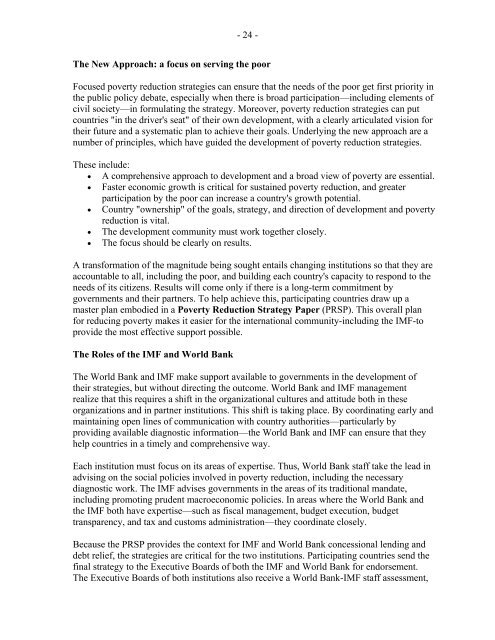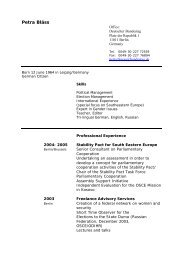What Is the International Monetary Fund? - the JVI eCampus!
What Is the International Monetary Fund? - the JVI eCampus!
What Is the International Monetary Fund? - the JVI eCampus!
You also want an ePaper? Increase the reach of your titles
YUMPU automatically turns print PDFs into web optimized ePapers that Google loves.
- 24 -<br />
The New Approach: a focus on serving <strong>the</strong> poor<br />
Focused poverty reduction strategies can ensure that <strong>the</strong> needs of <strong>the</strong> poor get first priority in<br />
<strong>the</strong> public policy debate, especially when <strong>the</strong>re is broad participation—including elements of<br />
civil society—in formulating <strong>the</strong> strategy. Moreover, poverty reduction strategies can put<br />
countries "in <strong>the</strong> driver's seat" of <strong>the</strong>ir own development, with a clearly articulated vision for<br />
<strong>the</strong>ir future and a systematic plan to achieve <strong>the</strong>ir goals. Underlying <strong>the</strong> new approach are a<br />
number of principles, which have guided <strong>the</strong> development of poverty reduction strategies.<br />
These include:<br />
• A comprehensive approach to development and a broad view of poverty are essential.<br />
• Faster economic growth is critical for sustained poverty reduction, and greater<br />
participation by <strong>the</strong> poor can increase a country's growth potential.<br />
• Country "ownership" of <strong>the</strong> goals, strategy, and direction of development and poverty<br />
reduction is vital.<br />
• The development community must work toge<strong>the</strong>r closely.<br />
• The focus should be clearly on results.<br />
A transformation of <strong>the</strong> magnitude being sought entails changing institutions so that <strong>the</strong>y are<br />
accountable to all, including <strong>the</strong> poor, and building each country's capacity to respond to <strong>the</strong><br />
needs of its citizens. Results will come only if <strong>the</strong>re is a long-term commitment by<br />
governments and <strong>the</strong>ir partners. To help achieve this, participating countries draw up a<br />
master plan embodied in a Poverty Reduction Strategy Paper (PRSP). This overall plan<br />
for reducing poverty makes it easier for <strong>the</strong> international community-including <strong>the</strong> IMF-to<br />
provide <strong>the</strong> most effective support possible.<br />
The Roles of <strong>the</strong> IMF and World Bank<br />
The World Bank and IMF make support available to governments in <strong>the</strong> development of<br />
<strong>the</strong>ir strategies, but without directing <strong>the</strong> outcome. World Bank and IMF management<br />
realize that this requires a shift in <strong>the</strong> organizational cultures and attitude both in <strong>the</strong>se<br />
organizations and in partner institutions. This shift is taking place. By coordinating early and<br />
maintaining open lines of communication with country authorities—particularly by<br />
providing available diagnostic information—<strong>the</strong> World Bank and IMF can ensure that <strong>the</strong>y<br />
help countries in a timely and comprehensive way.<br />
Each institution must focus on its areas of expertise. Thus, World Bank staff take <strong>the</strong> lead in<br />
advising on <strong>the</strong> social policies involved in poverty reduction, including <strong>the</strong> necessary<br />
diagnostic work. The IMF advises governments in <strong>the</strong> areas of its traditional mandate,<br />
including promoting prudent macroeconomic policies. In areas where <strong>the</strong> World Bank and<br />
<strong>the</strong> IMF both have expertise—such as fiscal management, budget execution, budget<br />
transparency, and tax and customs administration—<strong>the</strong>y coordinate closely.<br />
Because <strong>the</strong> PRSP provides <strong>the</strong> context for IMF and World Bank concessional lending and<br />
debt relief, <strong>the</strong> strategies are critical for <strong>the</strong> two institutions. Participating countries send <strong>the</strong><br />
final strategy to <strong>the</strong> Executive Boards of both <strong>the</strong> IMF and World Bank for endorsement.<br />
The Executive Boards of both institutions also receive a World Bank-IMF staff assessment,



